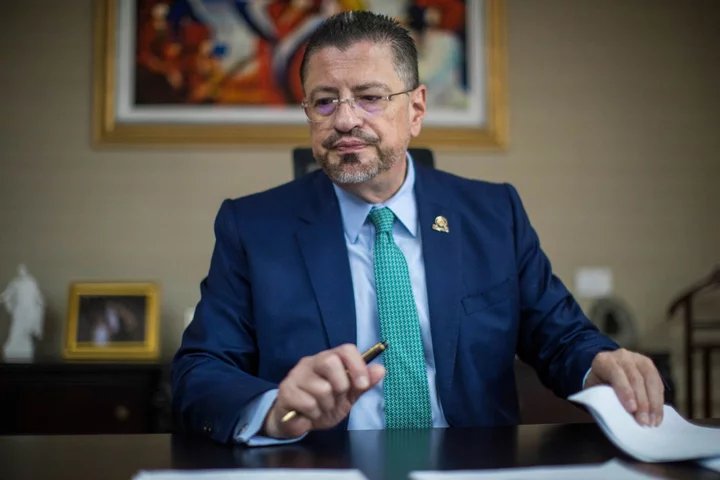Costa Rica’s days of living beyond its means and running up reckless amounts of debt are over, said the nation’s president, whose fiscal turnaround is winning over currency and bond traders.
“There’s a new sheriff in town,” President Rodrigo Chaves said Monday, in an interview in the presidential palace. “Our country isn’t going to take on excessive amounts of debt with irresponsible deficits, as it did for the last 40 years.”
Lea la nota en español.
Costa Rica has generous social programs compared with most of Latin America, but for years lawmakers repeatedly blocked attempts to raise taxes to pay for them. After nearly a decade of repeated credit rating downgrades, and a near-financial crisis in 2018, the nation dramatically reversed course over the last two years, and slashed the deficit under an International Monetary Fund Fund program.
“As long as I’m president, Costa Rica is going to be fiscally disciplined,” said Chaves, a former World Bank economist.
Fitch Ratings and S&P Global Ratings both upgraded Costa Rica this year as the country outperformed its targets under the IMF program.
“We are overperforming because we want to overperform,” Chaves said. “It’s about three things: discipline, discipline and discipline.”
Costa Rica’s currency has appreciated 15% since its congress approved the IMF deal in 2021, making it the best performer in the Americas. The nation’s dollar bonds are also among the world’s top performers over that period.
In March, the government cashed in on that positive sentiment with a $1.5 billion overseas debt sale. The bonds, due 2034, gained 0.2 cent to 102 cents on the dollar in early trading on Wednesday, taking the yield to 6.36%.
Read more: Costa Rica Sells $1.5 Billion in Return to Global Bond Markets
Fiscal Rule
The IMF said in a review of the country in April the government has space to modify its fiscal rule, or balanced-budget act, after it beat its 2022 targets by a comfortable margin.
Chaves wants to exclude state-controlled companies from the rule, so they don’t have their hands tied when they want to reinvest profits.
The government posted a primary surplus of 2.3% of gross domestic product last year, above its program target of 1%, and the IMF said the government is on track to exceed this year’s targets too.
“Costa Rica has made an impressive turnaround thanks in large part to the fiscal rule approved in 2018,” Eurasia Group analyst Risa Grais-Targow said. “However, we’re also seeing persistent efforts to make exceptions to the rule, and in a context in which there is broad political consensus against tax hikes.”
Foreign Investors
The government is also planning to change the rules governing securities markets, to make it easier for foreign investors to buy the nation’s local currency debt. The rule changes will eliminate some taxes for foreign investors and simplify cross-border custody and settlement procedures.
Costa Rica’s Central Bank this month raised its growth forecast for the year to 3.3% and projects faster growth for next year. A rebound in tourism, as foreigners return to see the nation’s beach towns, volcanoes and rainforests after the pandemic, is helping drive the recovery.
Chaves was sworn in to a four-year term in May 2022, and before that served as Finance Minister from 2019 to 2020.
--With assistance from Maria Elena Vizcaino.
(Updates with bond move in 8th paragraph.)

